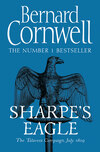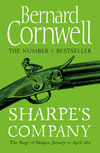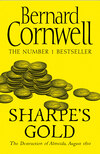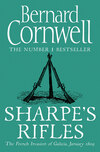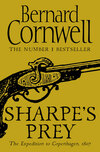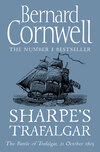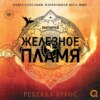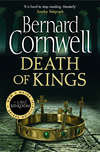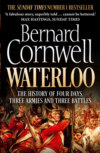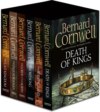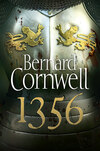Читать книгу: «The Sharpe Series», страница 3
Simmerson smiled back. ‘You use your own methods, Mr Sharpe. But I’ll leave the triangle where it is; I think I’m going to need it.’
Sharpe clapped his misshapen shako on to his head and gave the Colonel a salute of bone-cracking precision. ‘Don’t bother, sir. You won’t need a triangle. Good day, sir.’
Now make it happen, he thought.
CHAPTER THREE

‘I don’t bloody believe it, sir. Tell me it’s not true.’ Sergeant Patrick Harper shook his head as he stood with Sharpe and watched the South Essex Light Company fire two volleys to the orders of a Lieutenant. ‘Send this Battalion to Ireland, sir. We’d be a free country in two weeks! They couldn’t fight off a church choir!’
Sharpe gloomily agreed. It was not that the men did not know how to load and fire their muskets; it was simply that they did it with a painful slowness and a dedication to the drill book that was rigorously imposed by the Sergeants. There were officially twenty drill movements for the loading and firing of a musket, five of them alone applied to how the steel ramrod should be used to thrust ball and charge down the barrel and the Battalion’s insistence on doing it by the book meant that Sharpe had timed their two demonstration shots at more than thirty seconds each. He had three hours, at the most, to speed them up to twenty seconds a shot and he could understand Harper’s reaction to the task. The Sergeant was openly scornful.
‘God help us if we ever have to skirmish alongside this lot! The French will eat them for breakfast!’ He was right. The company was not even trained well enough to stand in the battle-line, let alone skirmish with the Light troops out in front of the enemy. Sharpe hushed Harper as a mounted Captain trotted across to them. It was Lennox, Captain of the Light Company, and he grinned down on Sharpe.
‘Terrifying, isn’t it?’
Sharpe was not sure how to reply. To agree might seem to be criticising the grizzled Scot who seemed friendly enough. Sharpe gave a non-committal answer and Lennox swung himself out of the saddle to stand beside him.
‘Don’t worry, Sharpe. I know how bad they are, but his Eminence insists on doing it this way. If he left it to me I’d have the bastards doing it properly but if we break one little regulation then it’s three hours’ drill with full packs.’ He looked quizzically at Sharpe. ‘You were at Assaye?’ Sharpe nodded and Lennox grinned again. ‘Aye, I remember you. You made a name for yourself that day. I was with the 78th.’
‘They made a name for themselves too.’
Lennox was pleased with the compliment. Sharpe remembered the Indian field and sight of the Highland Regiment marching in perfect order to assault the Mahratta lines. Great gaps were blown in the kilted ranks as they calmly marched into the artillery storm but the Scotsmen had done their job, slaughtered the gunners, and daringly reloaded in the face of a huge mass of enemy infantry that did not have the courage to counter-attack the seemingly invincible Regiment. Lennox shook his head.
‘I know what you’re thinking, Sharpe. What the devil am I doing here with this lot?’ He did not wait for an answer. ‘I’m an old man, I was retired, but the wife died, the half pay wasn’t stretching and they needed officers for Sir Henry bloody Simmerson. So here I am. Do you know Leroy?’
‘Leroy?’
‘Thomas Leroy. He’s a Captain here, too. He’s good. Forrest is a decent fellow. But the rest! Just because they put on a fancy uniform they think they’re warriors. Look at that one!’
He pointed to Christian Gibbons who was riding his black horse on to the field. ‘Lieutenant Gibbons?’ Sharpe asked.
‘You’ve met then?’ Lennox laughed. ‘I’ll say nothing about Mr Gibbons, then, except that he’s Simmerson’s nephew, he’s interested in nothing but women, and he’s an arrogant little bastard. Bloody English! Begging your pardon, Sharpe.’
Sharpe laughed. ‘We’re not all that bad.’ He watched as Gibbons walked his horse delicately to within a dozen paces and stopped. The Lieutenant stared superciliously at the two officers. So this, Sharpe thought, is Simmerson’s nephew? ‘Are we needed here, sir?’
Lennox shook his head. ‘No, Mr Gibbons, we are not. I’ll leave Knowles and Denny with Lieutenant Sharpe while he works his miracles.’ Gibbons touched his hat and spurred his horse away. Lennox watched him go. ‘Can’t do any wrong, that one. Apple of the Colonel’s bloodshot eye.’ He turned and waved at the company. ‘I’ll leave you Lieutenant Knowles and Ensign Denny, they’re both good lads but they’ve learned wrong from Simmerson. You’ve got a sprinkling of old soldiers, that’ll help, and good luck to you, Sharpe, you’ll need it!’ He grunted as he heaved himself into the saddle. ‘Welcome to the madhouse, Sharpe!’
Sharpe was left with the company, its junior officers, and the ranks of dumb faces that stared at him as though fearful of some new torment devised by their Colonel. He walked to the front of the company, watching the red faces that bulged over the constricting stocks and glistened with sweat in the relentless heat, and faced them. His own jacket was unbuttoned, shirt open, and he wore no hat. To the men of the South Essex he was like a visitor from another continent. ‘You’re in a war now. When you meet the French a lot of you are going to die. Most of you.’ They were appalled by his words. ‘I’ll tell you why.’
He pointed over the eastern horizon. ‘The French are over there, waiting for you.’ Some of the men looked that way as though they expected to see Bonaparte himself coming through the olive trees on the outskirts of Castelo Branco. ‘They’ve got muskets and they can all fire three or four shots a minute. Aimed at you. And they’re going to kill you because you’re so damned slow. If you don’t kill them first then they will kill you, it is as simple as that. You.’ He pointed to a man in the front rank. ‘Bring me your musket!’
At least he had their attention and some of them would understand the simple fact that the side which pumped out the most bullets stood the best chance of winning. He took the man’s musket, a handful of ammunition, and discarded his rifle. He held the musket over his head and went right back to the beginnings.
‘Look at it! One India Pattern musket. Fifty-five and a quarter inches long with a thirty-nine-inch barrel. It fires a ball three-quarters of an inch wide, nearly as wide as your thumb, and it kills Frenchmen!’ There was a nervous laugh but they were listening. ‘But you won’t kill any Frenchmen with it. You’re too slow! In the time it takes you to fire two shots the enemy will probably manage three. And, believe me, the French are slow. So, this afternoon, you will learn to fire three shots in a minute. In time you’ll fire four shots every minute and if you’re really good you should manage five!’
The company watched as he loaded the musket. It had been years since he had fired a smooth-bore musket but compared to the Baker rifle it was ridiculously easy. There were no grooves in the barrel to grip the bullet and no need to force the ramrod with brute force or even hammer it down. A musket was fast to load which was why most of the army used it instead of the slower, but much more accurate, rifle. He checked the flint, it was new and well seated in its jaws, so he primed and cocked the gun. ‘Lieutenant Knowles?’
A young Lieutenant snapped to attention. ‘Sir!’
‘Do you have a watch?’
‘Yes, sir.’
‘Can it time one minute?’
Knowles dragged out a huge gold hunter and snapped open the lid. ‘Yes, sir.’
‘When I fire you will keep an eye on that watch and tell me when one minute has passed. Understand?’
‘Yes, sir.’
He turned away from the company and pointed the musket down the field towards a stone wall. Oh God, he prayed, let it not misfire, and pulled the trigger. The swan neck with its gripped flint snapped forward, the powder in the pan flashed, and a fraction later the main charge exploded and he felt the heavy kick as the lead ball was punched out of the barrel in a gout of thick, white smoke.
Now it was all instinct; the never-forgotten motions. Right hand away from the trigger, let the gun fall in the left hand and as the butt hits the ground the right hand already has the next cartridge. Bite off the bullet. Pour the powder down the barrel but remember to keep a pinch for the priming. Spit in the ball. Ramrod out, up, and down the barrel. A quick push and then it’s out again, the gun is up, the cock back, priming in the pan, and fire into the lingering smoke of the first shot.
And again and again and again and memories of standing in the line with sweating, mad-eyed comrades and going through the motions as if in a nightmare. Ignoring the billows of smoke, the screams, edging left and right to fill up the gaps left by the dead, just loading and firing, loading and firing, letting the flames spit out into the fog of powder smoke, the lead balls to smash into the unseen enemy and hope they are falling back. Then the command to cease fire and you stop. Your face is black and stinging from the explosions of the powder in the pan just inches from your right cheek, your eyes smarting from the smoke and the powder grains, and the cloud drifts away leaving the dead and wounded in front and you lean on the musket and pray that the next time the gun would not hang-fire, snap a flint, or simply refuse to fire at all.
He pulled the trigger for the fifth time, the ball hammered away down the field, and the musket was down and the powder in the barrel before Knowles called ‘Time’s up!’
The men cheered, laughed and clapped because an officer had broken the rules and showed them he could do it. Harper was grinning broadly. He at least knew how difficult it was to make five shots in a minute and Sharpe knew that the Sergeant had noticed how he had cunningly loaded the first shot before the timed minute began. Sharpe stopped the noise. ‘That is how you will use a musket. Fast! Now you’re going to do it.’
There was silence. Sharpe felt the devilment in him; had not Simmerson told him to use his own method? ‘Take off your stocks!’ For a moment no one moved. The men stared at him. ‘Come on! Hurry! Take your stocks off!’
Knowles, Denny, and the Sergeants watched, puzzled, as the men gripped their muskets between their knees and used both hands to wrench apart the stiff leather collars.
‘Sergeants! Collect the stocks. Bring them here.’
The Battalion had been brutalised too much. There was no way he could teach them to be fast-shooting soldiers unless he offered them an opportunity to take their revenge on the system that had condemned them to a flogger’s Battalion. The Sergeants came to him, their faces dubious, their arms piled high with the hated stocks.
‘Put them down there.’ Sharpe made them heap the seventy-odd stocks about forty paces in front of the company. He pointed to the glistening heap. ‘That is your target! Each of you will be given just three rounds. Just three. And you will have one minute in which to fire them! Those who succeed, twice in a row, will drop out and have a lazy afternoon. The rest will go on trying and go on trying until they do succeed.’
He let the two officers organise the drill. The men were grinning broadly and there was a buzz of conversation in the ranks that he did not try to check. The Sergeants looked at him as though he were committing treason but none dared cross the tall, dark Rifleman with the long sword. When all was ready Sharpe gave the word and the bullets began smashing their way into the pile of leather. The men forgot their old drill and concentrated on shooting their hatred into the leather collars that had given them sore necks and which represented Simmerson and all his tyranny. At the end of the first two sessions only twenty men had succeeded, nearly all of them old soldiers who had re-enlisted in the new Battalion, but an hour and three-quarters later, as the sun reddened behind him, the last man fired his last shot into the fragments of stiff leather that littered the grass.
Sharpe lined the whole company in two ranks and watched, satisfied, as they shot three volleys to Harper’s commands. He looked through the white smoke that lingered in the still air towards the eastern horizon. Over there, in the Estramadura, the French were waiting, their Eagles gathering for the battle that had to come while behind him, in the lane that led from the town, Sir Henry Simmerson was in sight coming to claim his victory and his victims for the triangle.
‘For what we are about to receive,’ Harper said softly.
‘Quiet! Make them load. We’ll give the man a demonstration.’ Sharpe watched Simmerson’s eyes as the slow dawning of his men’s unbuttoned collars and the significance of the leather shreds on the grass occurred in his brain. Sharpe watched the Colonel take a deep breath. ‘Now!’
‘Fire!’ Harper’s command unleashed a full volley that echoed like thunder in the valley. If Simmerson shouted then his words were lost in the noise and the Colonel could only watch as his men worked their muskets like veterans to the orders of a Sergeant of the Rifles, even bigger than Sharpe, whose broad, confident face was of the kind that had always infuriated Sir Henry, provoking his most savage sentences from the uncushioned magistrates’ bench in Chelmsford.
The last volley rattled on to the stone wall and Forrest tucked his watch back into a pocket. ‘Two seconds under a minute, Sir Henry, and four shots.’
‘I can count, Forrest.’ Four shots? Simmerson was impressed because secretly he had despaired of teaching his men to fire fast instead of fumbling nervously. But a whole company’s stocks? At two and threepence a piece? And on a day when his nephew had come in smelling like a stable hand? ‘God damn your eyes, Sharpe!’
‘Yes, sir.’
The acrid powder smoke made Sir Henry’s horse twitch its head and the Colonel reached forward to quiet it. Sharpe watched the gesture and knew that he had made a fool of the Colonel in front of his own men and he knew, too, that it had been a mistake. Sharpe had won a small victory but in doing so he had made an enemy who had both power and influence. The Colonel edged his horse closer to Sharpe and his voice was surprisingly quiet. ‘This is my Battalion, Mr Sharpe. My Battalion. Remember that.’ He looked for a moment as if his anger would erupt but he controlled it and shouted at Forrest to follow him instead. Sharpe turned away. Harper was grinning at him, the men looked pleased, and only Sharpe felt a foreboding of menace like an unseen but encircling enemy. He shook it off. There were muskets to clean, rations to issue, and, beyond the border hills, enemies enough for anyone.
CHAPTER FOUR

Patrick Harper marched with a long easy stride, happy to feel the road beneath his feet, happy they had at last crossed the unmarked frontier and were going somewhere, anywhere. They had left in the small, dark hours so that the bulk of the march would be done before the sun was at its hottest and he looked forward to an afternoon of inactivity and hoped that the bivouac Major Forrest had ridden ahead to find would be near a stream where he could drift a line down the water with one of his maggots impaled on the hook. The South Essex were somewhere behind them; Sharpe had started the day’s march at the Rifle Regiment’s fast pace, three steps walking, three running, and Harper was glad that they were free of the suspicious atmosphere of the Battalion. He grinned as he remembered the stocks. There was a sobering rumour that the Colonel had ordered Sharpe to pay for every one of the seventy-nine ruined collars and that, to Harper’s mind, was a terrible price to pay. He had not asked Sharpe the truth of the rumour; if he had he would have been told to mind his own business, though, for Patrick Harper, Sharpe was his business. The Lieutenant might be moody, irritable, and liable to snap at the Sergeant as a means of venting frustration, but Harper, if pressed, would have described Sharpe as a friend. It was not a word that a Sergeant could use of an officer, but Harper could have thought of no other. Sharpe was the best soldier the Irishman had seen on a battlefield, with a countryman’s eye for ground and a hunter’s instinct for using it, but Sharpe looked for advice to only one man in a battle, Sergeant Harper. It was an easy relationship, of trust and respect, and Patrick Harper saw his business as keeping Richard Sharpe alive and amused.
He enjoyed being a soldier, even in the army of the nation that had taken his family’s land and trampled on their religion. He had been reared on the tales of the great Irish heroes, he could recite by heart the story of Cuchulain single-handedly defeating the forces of Connaught and who did the English have to put beside that great hero? But Ireland was Ireland and hunger drove men to strange places. If Harper had followed his heart he would be fighting against the English, not for them, but like so many of his countrymen he had found a refuge from poverty and persecution in the ranks of the enemy. He never forgot home. He carried in his head a picture of Donegal, a county of twisted rock and thin soil, of mountains, lakes, wide bogs and the smallholdings where families scratched a thin living. And what families! Harper was the fourth of his mother’s eleven children who survived infancy and she always said that she never knew how she had come to bear such ‘a big wee one’. ‘To feed Patrick is like feeding three of the others’ she would say and he would more often go hungry. Then came the day when he left to seek his own fortune. He had walked from the Blue Stack mountains to the walled streets of Derry and there got drunk, and found himself enlisted. Now, eight years later and twenty-four years old, he was a Sergeant. They would never believe that in Tangaveane!
It was hard now to think of the English as enemies. Familiarity had bred too many friendships. The army was one place where strong men could do well and Patrick Harper liked the responsibility he had earned and enjoyed the respect of other tough men, like Sharpe. He remembered the stories of his countrymen who had fought the redcoats in the hills and fields of Ireland and sometimes he wondered what his future would be if he were to go back and live in Donegal again. That problem of loyalty was too difficult and he kept it in the back of his mind, hidden away with the vestiges of his religion. Perhaps the war would go on for ever, or perhaps St Patrick would return and convert the English to the true faith? Who could tell? But for the moment he was content to be a soldier and took his pleasure where it could be found. Yesterday he had seen a peregrine falcon, high over the road, and Patrick Harper’s soul had soared to meet it. He knew every bird in Ulster, loved them, and as he walked he searched the land and sky for new birds because the Sergeant never tired of watching them. In the hills north of Oporto he had caught a quick glimpse of a strange magpie with a long blue tail, unlike anything he had seen before, and he wanted to see another. The expectation and the waiting were part of his content and his pleasure.
A hare started up in a field next to the road. A voice shouted ‘Mine’ and they all paused while the man knelt, took quick aim, and fired. He missed and Riflemen jeered as the hare twisted and disappeared in the rocks. Daniel Hagman did not miss often, he had learned to shoot from his poacher father, and all the Riflemen were secretly proud of the Cheshire man’s ability with the rifle. As he reloaded he shook his head sorrowfully. ‘Sorry, sir. Getting too old.’
Sharpe laughed. Hagman was forty but he could still outshoot the rest of the company. The hare had been running at two hundred yards and it would have been a miracle if it had ended up in the evening’s cooking pots.
‘We’ll take a rest,’ Sharpe said. ‘Ten minutes.’ He set two men as sentries. The French were miles away, there were British cavalry ahead of them on the road, but soldiers stayed alive by taking precautions and this was strange country so Sharpe kept a watch and the men marched with loaded weapons. He took off his pack and pouches, glad to be rid of the eighty pounds of weight, and sat beside Harper who was leaning back and staring into the clear sky. ‘A hot day for a march, Sergeant.’
‘It will be, sir, so it will. But better than that damned cold last winter.’
Sharpe grinned. ‘You managed to keep warm enough.’
‘We did what we could, sir, we did what we could. You remember the Holy Father in the Friary?’ Sharpe nodded but there was no way to stop Patrick Harper once he was launched into a good story. ‘He told us there was no drink in the place! No drink, and we were as cold as the sea in winter! It was a terrible thing to hear a man of God lie so.’
‘You taught him a lesson, Sarge!’ Pendleton, the baby of the company, just seventeen and a thief from the streets of Bristol, grinned over the road at the Irishman. Harper nodded. ‘We did, lad. You remember? No priest runs out of drink and we found it. My God, a barrel big enough to drown an army’s thirst and it did us that night. And we tipped the Holy Father head first into the wine to teach him that lying is a mortal sin.’ He laughed at the memory. ‘I could do with a drop right now.’ He looked innocently round the men resting on the verges. ‘Would anyone have a drop?’
There was silence. Sharpe leaned back and hid his smile. He knew what Harper was doing and he could guess what would happen next. The Rifles were one of the few Regiments that could pick and choose its recruits, rejecting all but the best, but even so it suffered from the besetting sin of the whole army; drunkenness. Sharpe guessed there were at least half a dozen bottles of wine within a few paces and Harper was going to find them. He heard the Sergeant get to his feet. ‘Right! Inspection.’
‘Sergeant!’ That was Gataker, too fly for his own good. ‘You inspected the water bottles this morning! You know we haven’t got any.’
‘I know you haven’t any in your water bottles but that’s not the same thing, is it?’ There was still no response. ‘Lay your ammunition out! Now!’
There were groans. Both the Portuguese and the Spanish would gladly sell wine to a man in exchange for a handful of cartridges made with British gunpowder, the finest in the world, and it was a fair bet that if any man had less than his eighty rounds then Harper would find a bottle hid deep in that man’s pack. Sharpe heard the sound of rummaging and scuffling. He opened his eyes to see seven bottles had magically appeared. Harper stood over them triumphantly. ‘We share these out tonight. Well done, lads, I knew you wouldn’t let me down.’ He turned to Sharpe. ‘Do you want a cartridge count, sir?’
‘No, we’ll get on.’ He knew the men could be trusted not to sell more than a handful of cartridges. He looked at the huge Irishman. ‘How many cartridges would you have, Sergeant?’
Harper’s face was sublimely honest. ‘Eighty, sir.’
‘Show me your powder horn.’
Harper smiled. ‘I thought you might like a drop of something tonight, sir?’
‘Let’s get on, then.’ Sharpe grinned at Harper’s discomfiture. In addition to the eighty rounds, twenty more than the rest of the army carried, Riflemen also carried a horn of fine powder that made for better shooting when there was time to use it. ‘All right, Sergeant. Ten minutes fast, then we’ll march easy.’
At midday they found Major Forrest with his small, mounted advance party waving to them from a stand of trees that grew between the road and the stream Harper had been hoping for. The Major led the Riflemen to the spot he had chosen for them. ‘I thought, Sharpe, that it might be best if you were some way from the Colonel?’
‘Don’t worry, sir.’ Sharpe grinned at the nervous Major. ‘I think that’s an excellent idea.’
Forrest was still worried. He looked at Sharpe’s men who were already hacking at the branches. ‘Sir Henry insists on fires being built in straight lines, Sharpe.’
Sharpe held up his hands. ‘Not a flame out of place, sir, I promise you.’
An hour later the Battalion arrived and the men threw themselves on to the ground and rested their heads on their packs. Some went to the stream and sat with blistered, swollen feet in the cool water. Sentries were posted, weapons stacked, the smell of tobacco drifted through the trees, and a desultory game of football started far away from the pile of baggage that marked the temporary officers’ mess. Last to arrive were the wives and children mixed with the Portuguese muleteers and their animals, Hogan and his mules, and the herd of cattle, driven by hired labour, that would provide the evening meals until the last beast was killed.
In the somnolent afternoon Sharpe felt restless. He had no family to write to and no desire to join Harper vainly tempting non-existent fish with his maggots. Hogan was sleeping, snoring gently in a patch of shade, so Sharpe got up from the grass, took his rifle, and strolled towards the picquet line and beyond. It was a beautiful day. No cloud disturbed the sky, the water in the stream flowed clear, a whisper of a breeze stirred the grass and flickered the pale leaves of the olive trees. He walked between the stream and a field of growing corn, jumped a crude, wicker dam that stopped an irrigation channel, and into a rock-strewn field of stunted olives. Nothing moved. Insects buzzed and clicked, a horse whinnied from the camp site, the sound of the water faded behind him. Someone had told him it was July. Perhaps it was his birthday. He did not know on which day he had been born but before his mother died he remembered her calling him a July-baby, or was it June? He remembered little else of her. Dark hair and a voice in the darkness. She had died when he was an infant and there was no other family.
The landscape crouched beneath the heat, still and silent, the Battalion swallowed up in the countryside as though it did not exist. He looked back down the road the Battalion had marched and far away, too far to see properly, there was a dust cloud where the main army was still on the road. He sat beside a gnarled tree trunk, rifle across his knees, and stared into the heat haze. A lizard darted across the ground, paused, looked at him, then ran up a tree trunk and froze as if he would lose sight of it because of its stillness. A speck of movement in the sky made him look up and high in the blue a hawk slid silently, its wings motionless, its head searching the ground for prey. Patrick would have known instantly what it was but to Sharpe the bird was just another hunter and today, he thought, there is nothing for us hunters and, as if in agreement, the bird stirred its wings and in a moment had gone out of view. He felt comfortable and lazy, at peace with the world, glad to be a Rifleman in Spain. He looked at the stunted olives with their promise of a thin harvest and wondered what family would shake the branches in the autumn, whose lives were bounded by the stream, the shallow fields, and the high, climbing road he would probably never see again.
Then there was a noise. Too hesitant and far off to sound an alarm in his head, but strange and persistent enough to make him alert and send his right hand to curl unconsciously round the narrow part of the rifle’s stock. There were horses on the road, only two from the sound of their hooves, but they were moving slowly and uncertainly and the sound suggested that something was wrong. He doubted that the French would have cavalry patrols in this part of Spain but he still got to his feet and moved silently through the grove, instinctively choosing a path that kept his green uniform hidden and shadowed until he stood in the bright sunlight and surprised the traveller.
It was the girl. She was still dressed like a man, in the black trousers and boots, with the same wide-brimmed hat that shadowed her beauty. She was walking, or rather limping like her horse, and at the sight of Sharpe she stopped and looked at him angrily as if she was annoyed at being seen unexpectedly. The servant, a slight, dark man leading the heavily loaded mule, stopped ten paces behind and stared mutely at the tall, scarred Rifleman. The mare also looked at Sharpe, swished its tail at the flies, and stood patiently with one hind leg lifted off the ground. The shoe was hanging loose, held by a single nail, and the animal must have suffered agonies on the heat of the stony road. Sharpe nodded at the hind foot. ‘Why didn’t you take the shoe off?’
Her voice was surprisingly soft. ‘Can you do it?’ She smiled at him, the anger going from her face, and for a second Sharpe said nothing. He guessed she was in her early twenties but she carried her looks with the assurance of someone who knew that beauty could be a better inheritance than money or land. She seemed amused at his hesitation, as though she was accustomed to her effect on men, and she raised a mocking eyebrow. ‘Can you?’
Sharpe nodded and moved to the horse’s rear. He pulled the hoof towards him, holding the pastern firmly, and the mare trembled but stayed still. The shoe would have fallen off within a few paces and he pulled it clear with the slightest tug and let the leg go. He held the shoe out to the girl. ‘You’re lucky.’
Her eyes were huge and dark. ‘Why?’
‘It can probably be put back on, I don’t know.’ He felt clumsy and awkward in her presence, aware of her beauty, suddenly tongue-tied because he wanted her very much. She made no move to take the shoe so he pushed it under the strap of a bulging saddlebag. ‘Someone will know how to shoe a horse up there.’ He nodded up the road. ‘There’s a Battalion camped up there.’
Начислим
+14
Покупайте книги и получайте бонусы в Литрес, Читай-городе и Буквоеде.
Участвовать в бонусной программе
